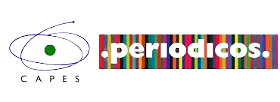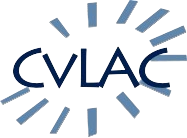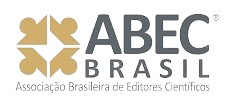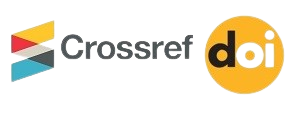Archives
-
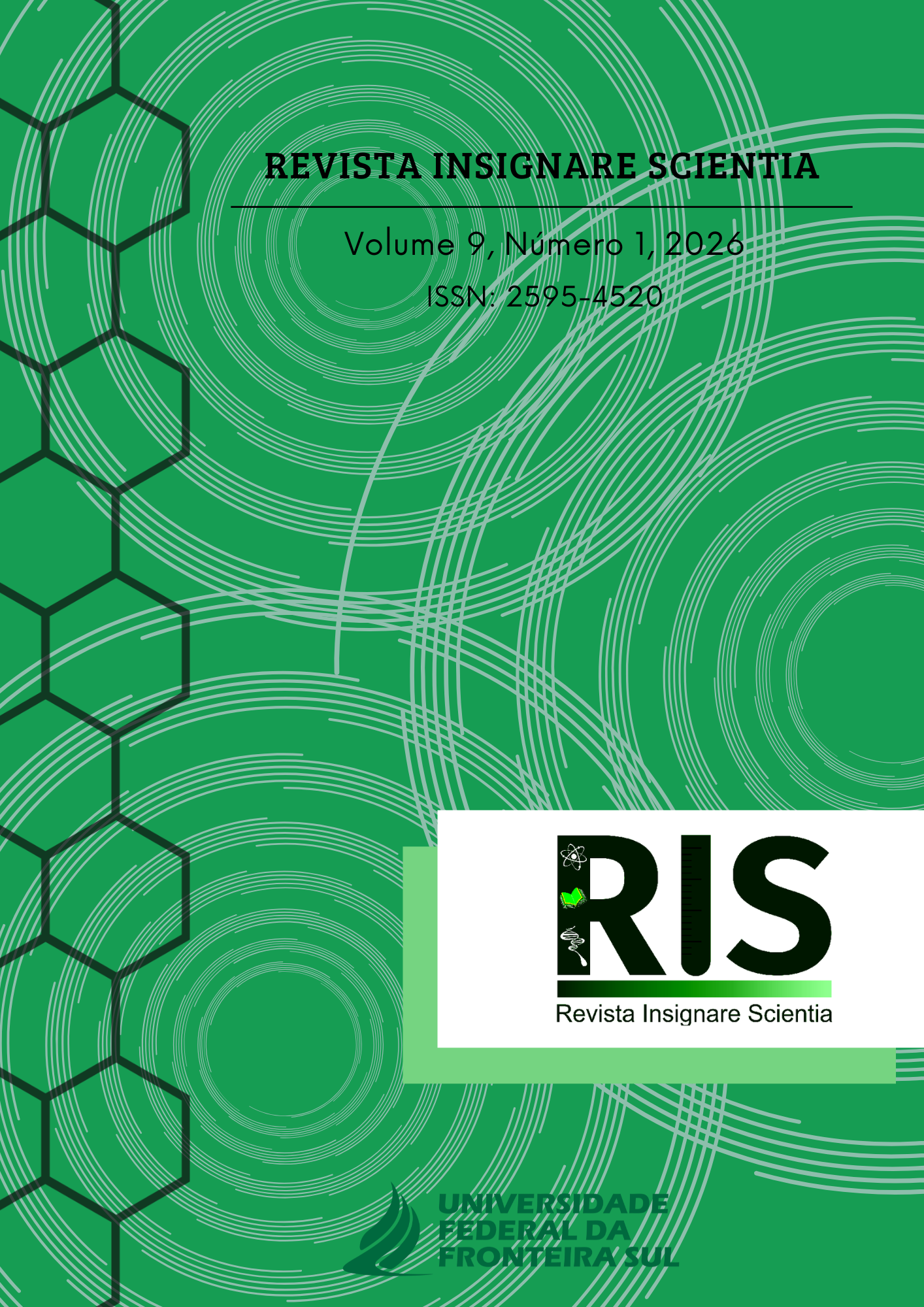
Revista Insignare Scientia (RIS)
Vol. 9 No. 1 (2026)The Revista Insignare Scientia (RIS) is a collective initiative resulting from the work carried out at the Universidade Federal da Fronteira Sul (UFFS), Cerro Largo Campus - RS, in the area of Natural Sciences, linked to the Grupo de Estudos e Pesquisa em Ensino de Ciências e Matemática (GEPECIEM) and to the Programa de Pós-Graduação em Ensino de Ciências (PPGEC). We have indexing processes in different databases. These registrations allow dissemination in national and international directories, thus expanding the reach and visibility of the research published worldwide.
Since 2025, RIS has adopted a continuous publication model. We publish academic works distributed across the different sections of the journal as a way to envision a scenario of Science Education that can be reflective, critical, and, at the same time, reconstructive and transformative.
We would like to take this opportunity to thank the reviewers who donate part of their time to building new knowledge, as well as the researchers who submitted papers to the journal.
We wish everyone an enjoyable read!
Prof. Dr. Erica do Espirito Santo Hermel - Scientific Editor of RIS. -

Revista Insignare Scientia (RIS)
Vol. 8 No. 1 (2025)The Revista Insignare Scientia (RIS) is a collective action resulting from the work carried out at the Universidade Federal da Fronteira Sul (UFFS), Campus Cerro Largo - RS, in the area of Natural Sciences, linked to the Study and Research Group in Science and Mathematics Teaching (GEPECIEM) and the Postgraduate Program in Science Teaching (PPGEC).
We are delighted to receive many submissions. Furthermore, we have indexing processes in different databases. These registrations provide dissemination in national and international directories, thus expanding the dissemination and visibility of the research published worldwide.
In this volume, the first of RIS adopting the continuous flow publication regime, there are academic works distributed in the different sections of the journal, as a way of projecting a scenario of a Science Education that can think, make itself and be critical, and at the same time reconstructive and transformative.
We take this opportunity to thank the reviewers who donated their time to build new knowledge and the researchers who submitted papers because ideas are the starting point for scientific development.
We wish everyone a good read!
Profa. Dra. Erica do Espirito Santo Hermel - Editor of RIS
-

Revista Insignare Scientia (RIS)
Vol. 7 No. 4 (2024)sep./dec. 2024
The Revista Insignare Scientia (RIS) is a collective action resulting from the work carried out at the Universidade Federal da Fronteira Sul (UFFS), Campus Cerro Largo - RS, in the area of Natural Sciences, linked to the Study and Research Group in Science and Mathematics Teaching (GEPECIEM) and the Postgraduate Program in Science Teaching (PPGEC).
We are delighted to receive many submissions. Furthermore, we have indexing processes in different databases. These registrations provide dissemination in national and international directories, thus expanding the dissemination and visibility of the research published worldwide.
In this volume, we take the opportunity to publish 21 academic papers distributed across the different sections of RIS, including research results, experiences, and didactic propositions as a way to project a scenario of Science Education that can think, be critical, and at the same time reconstructive and transformative.We take this opportunity to thank the reviewers who donated their time to build new knowledge and the researchers who submitted papers because ideas are the starting point for scientific development.
We wish everyone a good read!
Profa. Dra. Erica do Espirito Santo Hermel - Editor of RIS
-
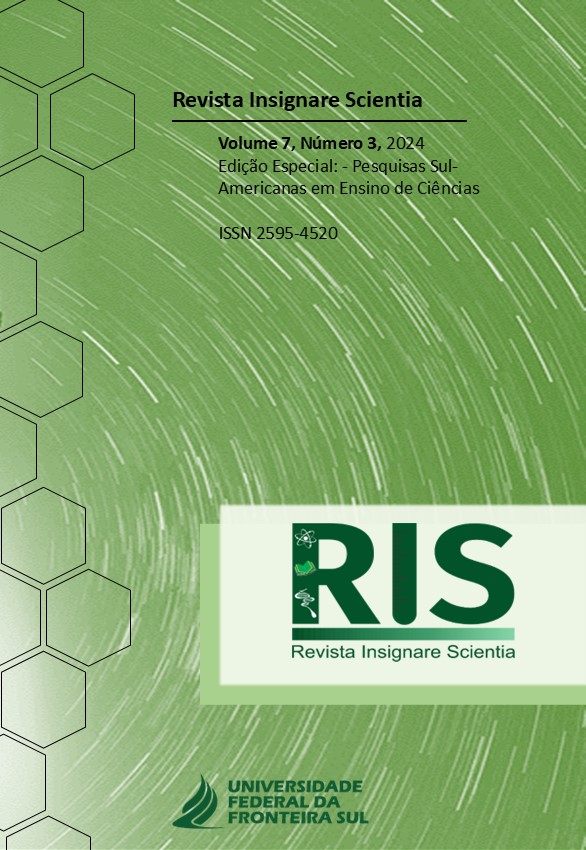
Revista Insignare Scientia - RIS - Pesquisas Sul-Americanas em Ensino de Ciências
Vol. 7 No. 3 (2024)This special edition of RIS: South American Research in Science Education presents 19 articles resulting from research presented at the II Simpósio Sul-Americano de Pesquisa em Ensino de Ciências. These articles cover different research projects conducted in South American institutions addressing different themes linked to the thematic axes that constituted the II SSAPEC.
We would like to thank the authors and researchers for the opportunity to learn more about and learn from their research, and the reviewers who donated their time to better qualify the different learning experiences that the organization of this publication provides us.
Enjoy your reading! -
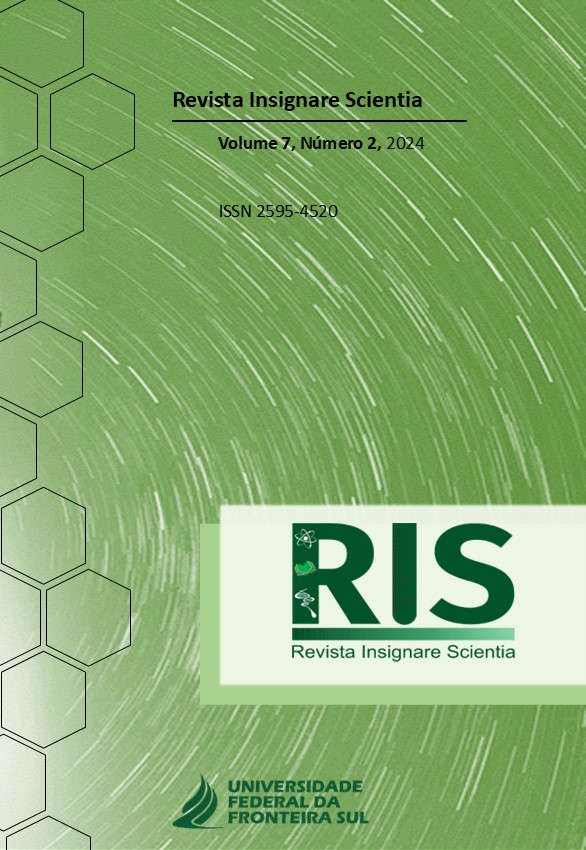
Revista Insignare Scientia
Vol. 7 No. 2 (2024)May/Aug. 2024
The Insignare Scientia Journal (RIS) is a collective action resulting from the work carried out at the Universidade Federal da Fronteira Sul (UFFS), Campus Cerro Largo - RS, in the area of Natural Sciences, linked to the Study and Research Group in Science and Mathematics Teaching (GEPECIEM) and the Postgraduate Program in Science Teaching (PPGEC).
We are delighted to receive many submissions in a continuous flow. Furthermore, we have indexing processes in different databases. These registrations provide dissemination in national and international directories, thus expanding the dissemination and visibility of the research published worldwide.
In this volume, we take the opportunity to publish 16 academic papers distributed across the different sections of RIS, including research results, experiences, and didactic propositions as a way to project a scenario of science education that can think, be critical, and at the same time reconstructive and transformative.We take this opportunity to thank the reviewers who donated their time to build new knowledge and the researchers who submitted papers because ideas are the starting point for scientific development.
May we have a long life for RIS.
We wish everyone a good read!
Prof. Dr. Rosangela Inês Matos Uhmann - Editor of RIS
-
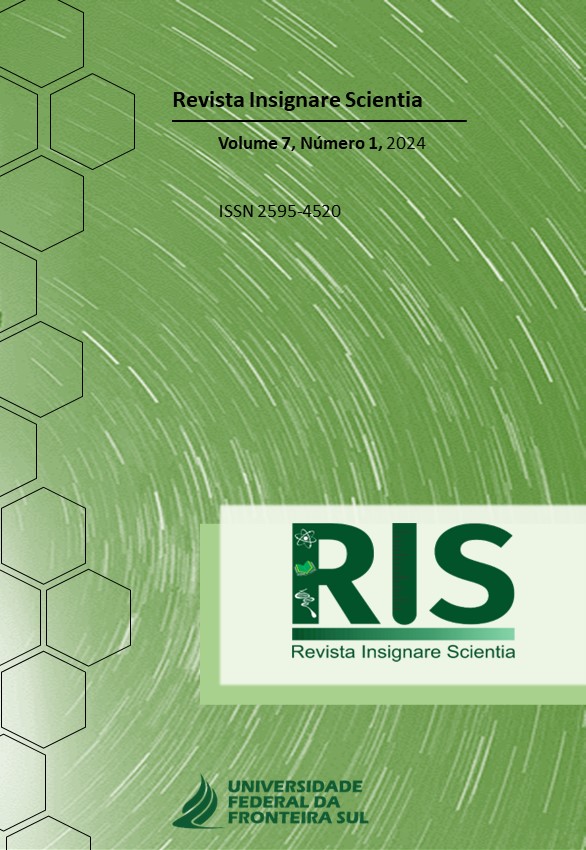
Insignare Scientia Journal
Vol. 7 No. 1 (2024)Jan./Apr. 2024
The Insignare Scientia Journal (RIS) is a collective action resulting from the work carried out at the Universidade Federal da Fronteira Sul (UFFS), Campus Cerro Largo - RS, in the area of Natural Sciences, linked to the Study and Research Group in Science and Mathematics Teaching (GEPECIEM) and the Postgraduate Program in Science Teaching (PPGEC).
We are delighted to receive many submissions in a continuous flow. Furthermore, we have indexing processes in different databases. These registrations provide dissemination in national and international directories, thus expanding the dissemination and visibility of the research published worldwide.
In this volume, we take the opportunity to publish 35 academic papers distributed across the different sections of RIS, including research results, experiences, and didactic propositions as a way to project a scenario of science education that can think, be critical, and at the same time reconstructive and transformative.We take this opportunity to thank the reviewers who donated their time to build new knowledge and the researchers who submitted papers because ideas are the starting point for scientific development.
May we have a long life for RIS.
We wish everyone a good read!
Prof. Dr. Rosangela Inês Matos Uhmann - Editor of RIS
-
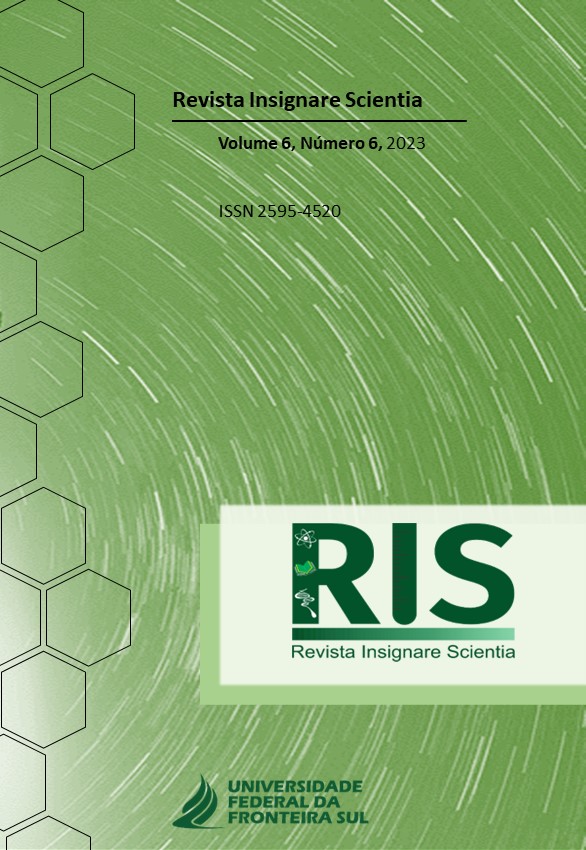
Insignare Scientia Journal
Vol. 6 No. 6 (2023)Sep./Dec. 2023
The Insignare Scientia Journal (RIS) is a collective action resulting from the work conducted at the Universidade Federal da Fronteira Sul (UFFS), Campus Cerro Largo - RS, in the field of Natural Sciences. It is linked to the Group of Studies and Research in Science and Mathematics Education (GEPECIEM) and the Postgraduate Program in Science Education (PPGEC).As we conclude 2023, we have much to celebrate, as we are receiving numerous submissions through the continuous flow, as well as for special editions. Additionally, we have indexing processes in various databases. These listings ensure dissemination in national and international directories, thus increasing the visibility and reach of the research published worldwide.
In this volume, we are pleased to publish 44 academic works distributed across the different sections of RIS, including research results, experiences, and didactic proposals. These contributions aim to project a scenario of Science Education that can think, evolve, and be critical, while also being reconstructive and transformative.
We take this opportunity to thank the reviewers who dedicate their time to fostering new learning, as well as the researchers who submitted their work, as ideas are the starting point for scientific development.
May RIS have a long and successful life.
We wish everyone happy reading!
Prof. Dr. Rosangela Inês Matos Uhmann
Editor of RIS -
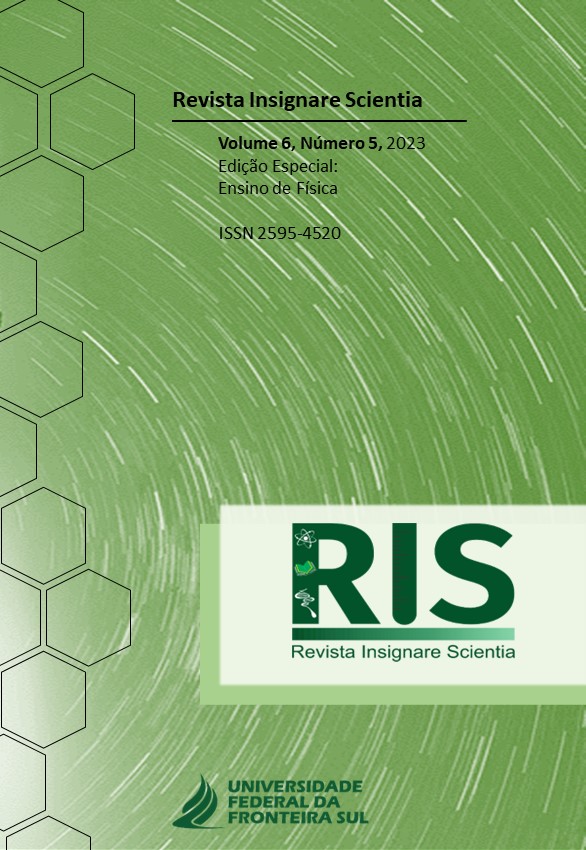
Special Edition: Physics Education
Vol. 6 No. 5 (2023)With this special volume: Physics Education, we hope to contribute to the discussions in the field by presenting a collection of works, including articles and experience reports, aimed at enriching the community of researchers in Physics Education and expanding the discussions they may provoke.
The 15 articles and experience reports are supported by theoretical and methodological possibilities, showcasing research from various scholars across Brazil. We emphasize that these articles and reports highlight the importance of believing in the cultural potential of writing, reading, and dialogue, as the dissemination of such research is crucial in contemporary times.
We conclude with our gratitude to those who made this publication possible and extend a special invitation to read the articles in this edition.
Prof. Dr. Rosangela Inês Matos Uhmann
Editor of RIS -
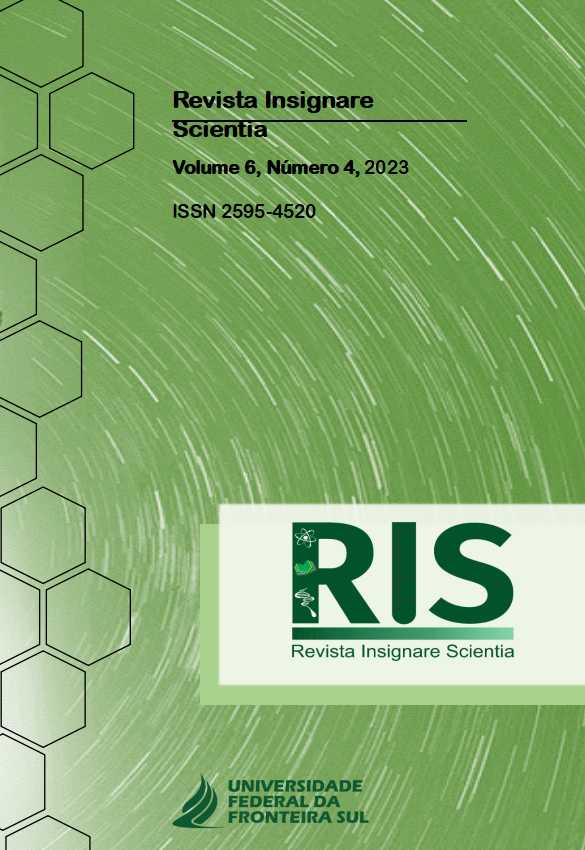
Insignare Scientia Journal
Vol. 6 No. 4 (2023)May/Aug. 2023
The Insignare Scientia Journal (RIS) is a collective action resulting from the work conducted at the Universidade Federal da Fronteira Sul (UFFS), Campus Cerro Largo - RS, in the field of Natural Sciences. It is linked to the Group of Studies and Research in Science and Mathematics Education (GEPECIEM) and the Postgraduate Program in Science Education (PPGEC). This publication is organized as Vol. 6, No. 4 (covering May-August), meaning that publications are quarterly.
We are pleased to present significant works for Science Education. It is worth visiting! It is important to highlight that we have indexing processes in various databases, including the CAPES Journal Portal. These listings ensure dissemination in national and international directories, enhancing the visibility and reach of the articles, reports, proposals, and other content published globally. Additionally, we have a counter on the journal's page that is already showing positive results! In this volume, we are publishing academic works distributed across the different sections of RIS, aiming to project a scenario of Science Education so that we can think, reflect, engage critically, and simultaneously be reconstructive and transformative.
We take this opportunity to thank the reviewers who dedicate their time to fostering new learning, as well as the researchers who submitted their work for the advancement of science.
May RIS have a long life; it is currently ranked Qualis A4.
We wish you a good read!
Prof. Dr. Rosangela Inês Matos Uhmann
Editor of RIS -
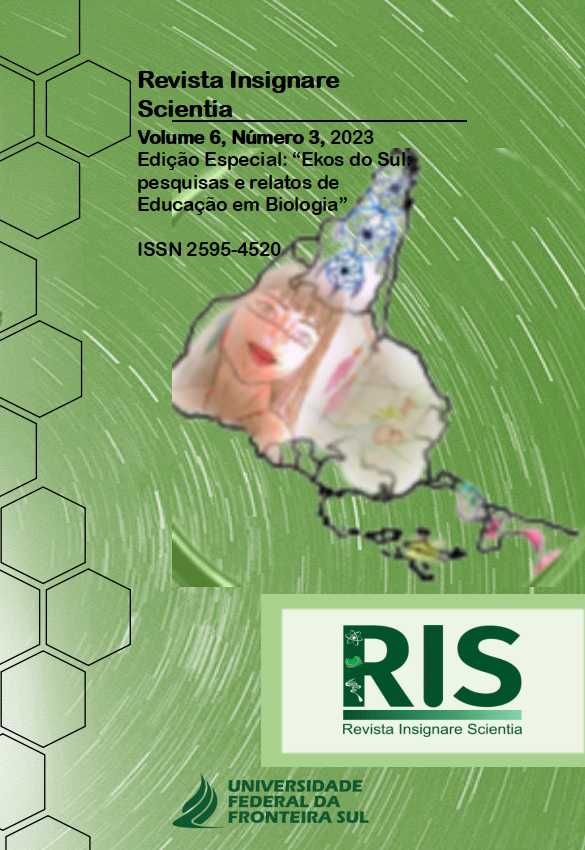
Special Edition: "Ekos do Sul: Research and Reports on Biology Education"
Vol. 6 No. 3 (2023)In the special edition "Ekos do Sul: Research and Reports on Biology Education," studies are gathered that are supported by multiple socio-theoretical and methodological possibilities, for instance, research conducted by various researchers from Brazil. We emphasize that these studies contribute to building and re-signifying cultural practices in a society that aims to be welcoming and recognizing of the basic and cultural rights of its citizens. Therefore, the 13 papers in this edition result from reflections on the cultural education system, which is of fundamental importance in our time, given the intensity with which each scientific production was developed by the authors. We also express our gratitude to those who made this publication possible and extend a special invitation to read the studies in this edition.
Prof. Dr. Rosangela Inês Matos Uhmann
Editor of RIS -
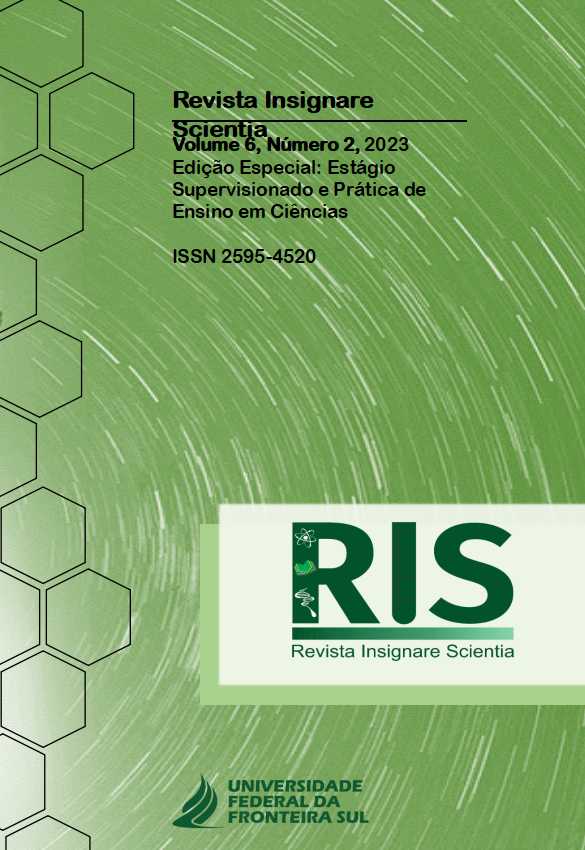
Special Edition: Supervised Internship and Teaching Practice in Science
Vol. 6 No. 2 (2023)This special edition of RIS presents the Dossier "Supervised Internship and Teaching Practice in Science", which brings articles that discuss/problematic issues of Science Teaching from different theoretical-methodological perspectives, representing the various possibilities of investigating pedagogical practice in different teaching modalities.
The Dossier is composed of twenty-seven articles that contemplate supervised internship, curriculum, among others, developed by researchers from different regions of Brazil, making evident in the research the search for the improvement of pedagogical didactic practices, as well as the investigation of the teaching practice itself in order to achieve pedagogical praxis. These are researches that go through the processes of teaching, learning, conceptual meaning, teaching knowledge, and professional development.
We thank the organizers of this Dossier for providing this publication with such a wealth of contexts and investigations.
A good read!
Dr. Rosangela Inês Matos Uhmann - General Coordinator of RIS
-
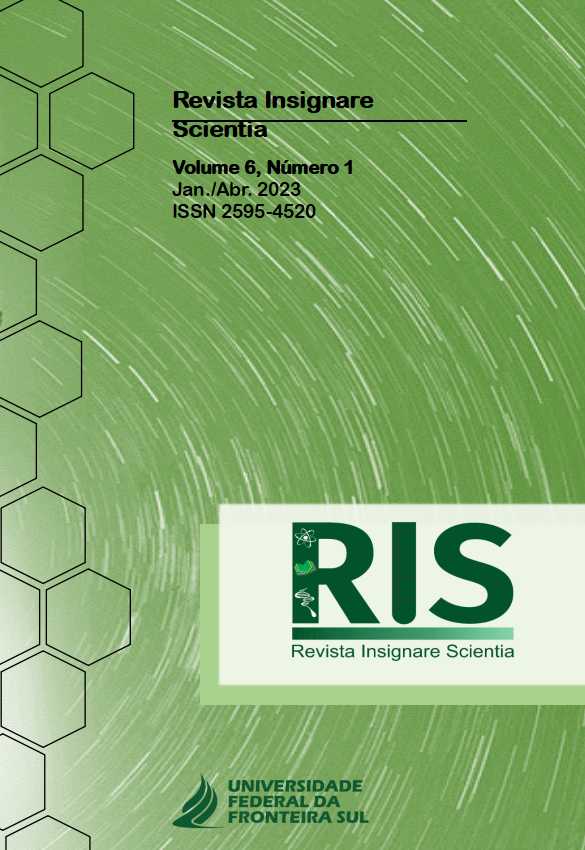
Insignare Scientia Journal
Vol. 6 No. 1 (2023)Jan./Apr. 2023
The Insignare Scientia Journal (RIS) is a collective action resulting from the work carried out at the Universidade Federal da Fronteira Sul (UFFS), Campus Cerro Largo - RS, in the area of Natural Sciences, linked to the Study and Research Group in Science and Mathematics Teaching (GEPECIEM) and the Postgraduate Program in Science Teaching (PPGEC). This publication is organized as V.6, n.1 (corresponding to January-April), with publications being every four months.
We are in the sixth year of editing RIS. We are happy to present important works for Science Education. It's worth visiting! It is worth noting that we have indexing processes in different databases, including also in the Capes Journal Portal. These are the registrations that provide dissemination in national and international directories, expanding the dissemination and visibility of articles, reports, proposals... published worldwide. Furthermore, we have a counter that was inserted on the magazine page and is already showing positive results! In this volume, we are publishing 28 academic papers distributed in the different sections of the RIS, among them, the results of research as a way to project a scenario of Science education so that we can think, reflect, make ourselves and be critical and at the same time reconstructive and transformative.
We take this opportunity to thank the reviewers who donate their time to build new learning, as well as the researchers who submitted their work for the sake of the development of scientific knowledge.
May we have a long life for RIS, which currently has a Qualis A4 (2017-2020).
We wish you a good reading!
Prof. Dr. Rosangela Inês Matos Uhmann - Editor of RIS
-
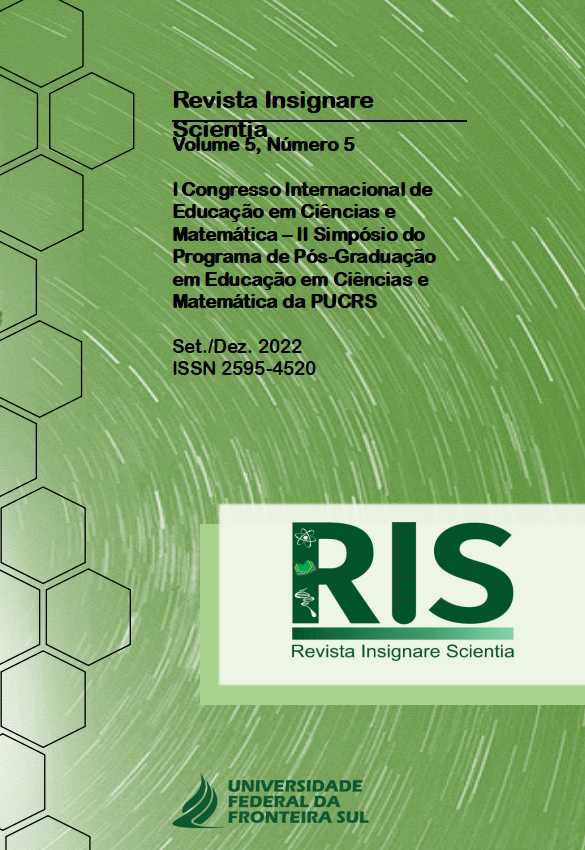
Special Edition: I International Congress on Science and Mathematics Education – II Symposium of the Postgraduate Program in Science and Mathematics Education at PUCRS
Vol. 5 No. 5 (2022)The Insignare Scientia Journal (RIS) is a collective action resulting from the work carried out at the Universidade Federal da Fronteira Sul (UFFS), Campus Cerro Largo - RS, in the area of Natural Sciences, linked to the Study and Research Group in Science and Mathematics Teaching (GEPECIEM) and the Postgraduate Program in Science Teaching (PPGEC).
This special edition of RIS is composed of 26 theoretical and empirical articles which were shared at the 1st International Congress of Education in Science and Mathematics that took place at the Pontifical Catholic University of Rio Grande do Sul – PUCRS in September 2022. The event was proposed by the Postgraduate Program in Science and Mathematics Education – EDUCEM/PUCRS.
The articles selected for this publication encompass discussions and reflections on teacher training, teaching, learning, and research in Science and Mathematics Education from current themes that permeate Basic Education and Higher Education at national and international levels.
We thank and congratulate the authors and researchers for the articles, as well as the reviewers who collaborated to further qualify the writing of the texts.
The invitation to read remains!
Danusa de Lara Bonotto
Editor of RIS -
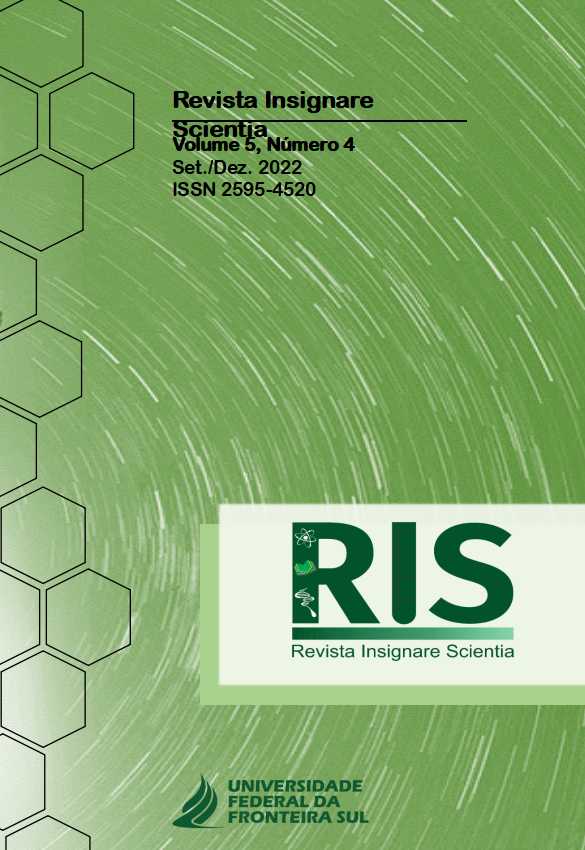
Insignare Scientia Journal
Vol. 5 No. 4 (2022)Set./Dec. 2022
The Insignare Scientia Journal (RIS) is a collective action resulting from the work carried out at the Universidade Federal da Fronteira Sul (UFFS), Campus Cerro Largo - RS, in the area of Natural Sciences, linked to the Study and Research Group in Science and Mathematics Teaching (GEPECIEM) and the Postgraduate Program in Science Teaching (PPGEC). This publication is organized as V.5, n.4 (corresponding to September-December), that is, the publications are quarterly.
We are in the fifth year of editing RIS. We are happy to present important works for Science Education. It's worth visiting! It is worth noting that we have indexing processes in different databases, including also in the Capes Journal Portal. These are the registrations that provide dissemination in national and international directories, expanding the dissemination and visibility of articles, reports, proposals... published worldwide. Furthermore, we have a counter that was inserted on the magazine page and is already showing positive results! In this volume, we are publishing 23 academic papers distributed across the different sections of RIS, among them, the results of research as a way to project a scenario of Science education so that we can think, reflect, make ourselves and be critical and at the same time reconstructive and transformative.
We take this opportunity to thank the reviewers who donate their time to build new learning, as well as the researchers who submitted their work for the sake of scientific development.
May we have a long life for RIS, which currently has a Qualis A4 rating.
We wish you a good reading!
Prof. Dr. Rosangela Inês Matos Uhmann - Editor of RIS
-
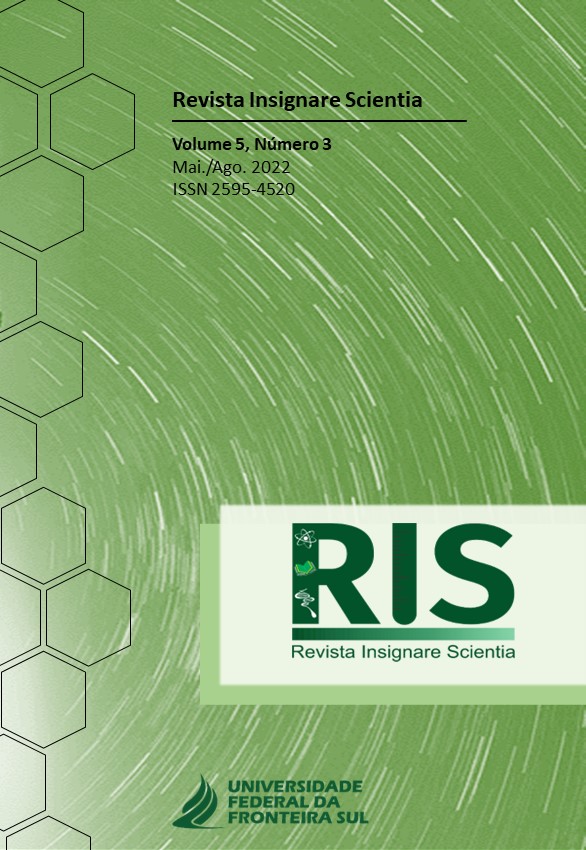
Insignare Scientia Journal
Vol. 5 No. 3 (2022)May/Aug. 2022
The Insignare Scientia Journal (RIS) is a collective action resulting from the work carried out at the Universidade Federal da Fronteira Sul (UFFS), Campus Cerro Largo - RS, in the area of Natural Sciences, linked to the Study and Research Group in Science and Mathematics Teaching (GEPECIEM) and the Postgraduate Program in Science Teaching (PPGEC). This publication is organized as V.5, n.3 (corresponding to May-August), that is, the publications are quarterly.
We are in the fifth year of editing RIS. We are happy to present important works for Science Education. It's worth visiting! We are receiving many submissions on a rolling basis. In addition, we have indexing processes in different databases. These are the registrations that provide dissemination in national and international directories, expanding the dissemination and visibility of articles, reports... published worldwide. Furthermore, we have a counter that was inserted on the magazine page and is already showing positive results! In this volume, we are publishing 22 academic papers distributed across the different sections of RIS, among them, the results of research as a way to project a scenario of Science education so that we can think, reflect, make ourselves and be critical and at the same time reconstructive and transformative.
We take this opportunity to thank the reviewers who donate their time to build new learning, as well as the researchers who submitted papers for the sake of scientific development.
May we have a long life for RIS.
We wish you a good reading!
Prof. Dr. Rosangela Inês Matos Uhmann - Editor of RIS
-
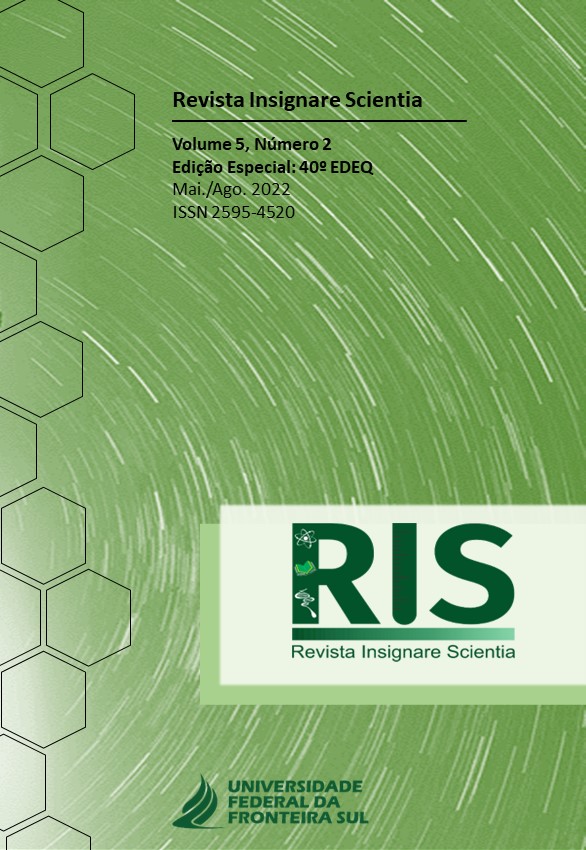
Special Edition: 40th EDEQ
Vol. 5 No. 2 (2022)This special edition of RIS presents the Dossier organized with works presented during the 40th EDEQ, held from October 25 to 29, 2021, which had as its central theme: How to train chemistry teachers for social, official, and technological demands of contemporary Brazil.
The Dossier is composed of twenty-eight articles that cover various themes developed by researchers in the field of Chemistry education in Brazil, becoming evident in the reports and research that seek to discuss Chemistry Education in the current context, in view of the demands currently presented.
We thank the organizers of this Dossier for providing us with this publication with such a wealth of contexts and investigations.
A good read!
Ademar Antonio Lauxen
Universidade de Passo Fundo – UPF
Fabiane de Andrade Leite
Universidade Federal da Fronteira Sul – UFFS
Maurivan Güntzel Ramos
Pontifícia Universidade Católica do Rio Grande do Sul –PUCRS
-
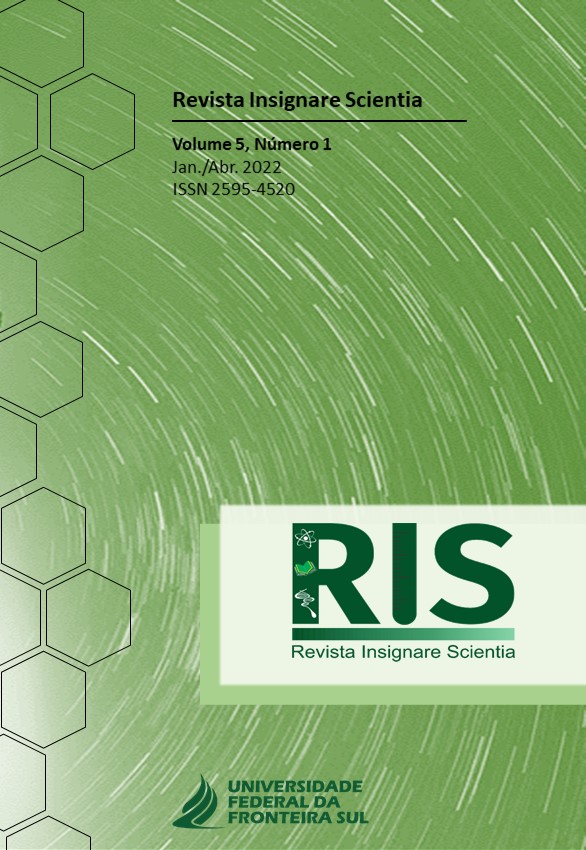
Insignare Scientia Journal
Vol. 5 No. 1 (2022)Jan./Apr. 2022
The Insignare Scientia Journal (RIS) is a collective action resulting from the work carried out at the Universidade Federal da Fronteira Sul (UFFS), Campus Cerro Largo - RS, in the area of Natural Sciences, linked to the Study and Research Group in Science and Mathematics Teaching (GEPECIEM) and the Postgraduate Program in Science Teaching (PPGEC).
We are in the fifth year of editing RIS. We are happy to present with many very important works for Science Education. It's worth visiting! We are receiving many submissions on a rolling basis. In addition, we have indexing processes in different databases. These are the registrations that provide dissemination in national and international directories, expanding the dissemination and visibility of articles, reports... published worldwide. Furthermore, we have a counter that was inserted on the magazine page and is already showing positive results! This is the first volume of 2022. In this issue, we are publishing 33 academic papers distributed across the different sections of RIS, including research results, experiences, and didactic propositions as a way to project a scenario of science education that can be critical, reconstructive, and transformative at the same time.
We take this opportunity to thank the reviewers who donate their time to build new learning, as well as the researchers who submitted papers for the sake of scientific development.
May we have a long life for RIS.
We wish you a good reading!
Prof. Dr. Rosangela Inês Matos Uhmann - Editor of RIS
-
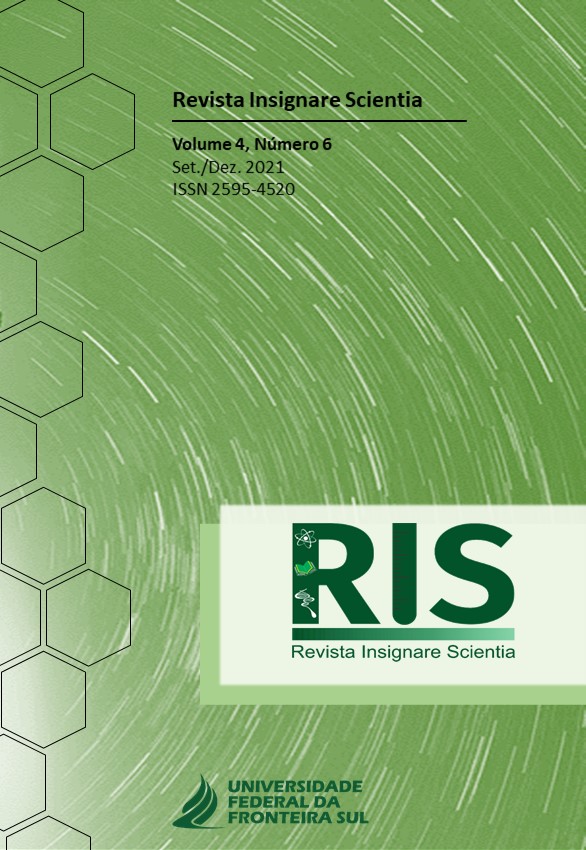
Insignare Scientia Journal
Vol. 4 No. 6 (2021)Sep./Dec. 2021
The Insignare Scientia Journal (RIS) is a collective action resulting from the work carried out at the Universidade Federal da Fronteira Sul (UFFS), Campus Cerro Largo - RS, in the area of Natural Sciences, linked to the Study and Research Group in Science and Mathematics Teaching (GEPECIEM) and the Postgraduate Program in Science Teaching (PPGEC).
In this fourth year of RIS edition, we have much to celebrate, as we are receiving many submissions in the continuous flow, as well as in special editions. In addition, we have the assignment of the DOI and indexing processes in different databases. These registrations provide dissemination in national and international directories, thus expanding the dissemination and visibility of articles published worldwide. Furthermore, we have a counter that was inserted on the magazine page and is already showing positive results! This is the last volume of 2021. In this issue, we are publishing 37 academic papers distributed across the different sections of RIS, including research results, experiences, and didactic propositions as a way to project a scenario of science education that can be critical, reconstructive, and transformative at the same time.
We take this opportunity to thank the reviewers who donate their time to build new learning, as well as the researchers who submitted papers for the sake of scientific development.
May we have a long life for RIS.
We wish you a good reading!
Prof. Dr. Rosangela Inês Matos Uhmann - Editor of RIS
-
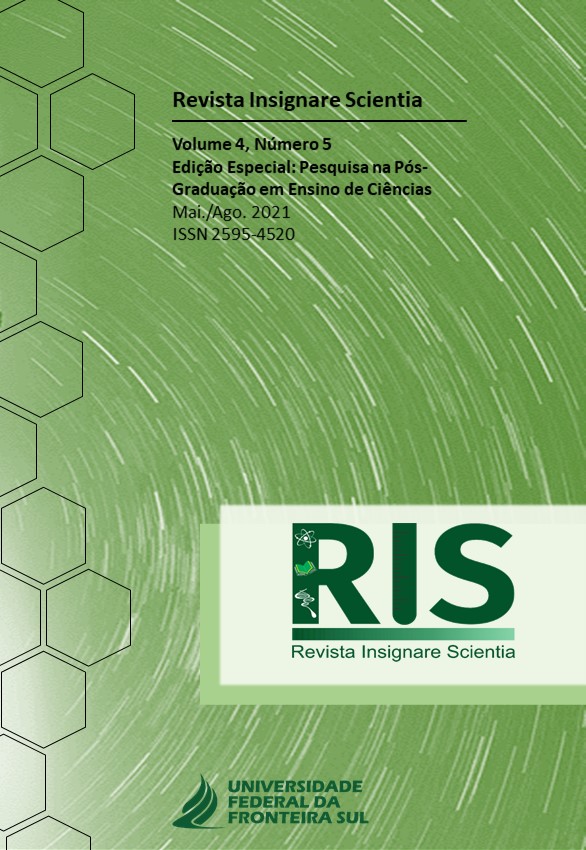
Special Edition: Research in Postgraduate Education in Science Teaching
Vol. 4 No. 5 (2021)In this special edition of the Insignare Scientia Journal (RIS), we present the dossier “Research in Postgraduate Education in Science Teaching” with eighteen articles, in which we seek to strengthen the commitment to the field through discussions on various empirical and theoretical research universes. Education, like other segments of society, has been affected by the social, economic, political, and cultural changes brought about by an unexpected context that affected all continents in 2020 and 2021. In the search to reflect on these changes and dialogue with the different theoretical and methodological perspectives associated with the field of Science Education, we present a set of texts carefully prepared by a group of researchers who are part of a research network in this area in Latin America. The texts, in addition to being by authors from national and international institutions, are the result of research developed by this group and seek to contribute to instigating reflections on an educational scenario that is being shaped in multiple aspects.
This introduction locates that the dossier is composed of collectives of researchers who share the context of the Red Internacional de Investigación en Enseñanza de las Ciencias (RIEC) and conduct studies within the scope of postgraduate studies in Latin American countries. There are fourteen texts by researchers affiliated with Brazilian institutions and four from programs of international institutions, both linked to RIEC, which we now present in continuation.
The first article presents an account of a didactic strategy carried out in the Energy and Environment course, which is part of the Postgraduate Program in Science and Mathematics Teaching (PPGECM) at the Universidade de Passo Fundo (UPF), RS. In the text, the authors describe the process of building a didactic tool called lapbook, by eight master's students with pedagogical training in the fields of Biology, Physics, Mathematics, and Chemistry.
Next, we have an article signed by researchers from the Universidad Nacional del Comahue (UNComa), Argentina. The bibliographic text presents an educational research on seed germination, based on a review of articles published in indexed open-access journals.
The third article contains another bibliographic research, of a theoretical nature carried out through a review of dissertations and theses, which aimed to map what has been researched about the knowledge produced and mobilized by Biology teachers, in the context of the training of these professionals.
A theoretical essay makes up the fourth article, which aims to discuss the importance of postgraduate studies for the training of teachers capable of acting professionally in the current scenario, contributing to the confrontation and transformation of reality.
In the fifth article, the researchers conduct a study in two postgraduate programs in Brazil and state that, even though they are “young,” the contexts have a consolidated identity in terms of theoretical frameworks and disciplinary/interdisciplinary profile. At the same time, the authors point out the existence of bottlenecks in the training of postgraduates, as some important theoretical perspectives for science education in Brazil are absent.
The sixth article analyzes the National High School Curriculum Parameters (PCNs) and the National Common Curricular Base (BNCC), with specific attention to the area of Natural Sciences and their Technologies, investigating, through a documentary bibliographic research, the continuities or ruptures, similarities or differences of the competencies prescribed in each of them.
In the seventh article, the authors present in the form of an essay bibliographic aspects that can establish a dialogue between scientific literacy and philosophical logic. Based on the reflections resulting from the study, they consider that argumentative logic can contribute to the process of scientific literacy in young people and children, helping to develop critical and reflective thinking in the face of the pseudoscientific tricks so widespread in contemporary times.
The eighth article presents discussions on the importance of developing learning objects in the Professional Master's course that is part of the Postgraduate Program in Scientific and Technological Teaching (PPGEnCT) at the Universidade Regional Integrada do Alto Uruguai e das Missões (URI), Santo Ângelo, RS. In the text, the authors aim to report the development of a software teaching prototype to be used in the electrical circuits curriculum component.
The ninth article presents part of a professional master's dissertation study that sought to analyze the questions of the Natural Sciences and their Technologies exam, from the National High School Exam (ENEM), in the period 2015-2019. The study analyzed issues related to Brazilian biomes in the Biology exam, noting that, in the analyzed period, knowledge about Ecology was frequent in the exams, while those related to Brazilian biomes were practically nonexistent.
Next, we have the tenth article that aimed to investigate the understanding of problems presented in certain situations, by Basic Education students who participated in a Junior Scientific Initiation project for a period of six months.
In the eleventh article, researchers from the Universidad Pedagógica Nacional (UNP), Colombia, present the progress of an investigation that characterized the environmentalized content in a postgraduate course in Chemistry teaching, determining its levels of environmentalization. According to the authors, understanding this environmentalization remains a challenge for teaching due to the lack of teacher training and commitment to institutional and national policies.
The twelfth article presents the result of an investigation carried out in the Postgraduate Program in Science, Technology, Engineering, and Mathematics (PPGSTEM) at the Universidade Estadual do Rio Grande do Sul (UEGRS), with the aim of highlighting the path taken by a research group in the conception, creation, and management of a postgraduate course.
The Postgraduate Program in Teaching Exact Sciences (PPGECE) at the Universidade do Vale do Taquari (Univates) located in Lajeado, Rio Grande do Sul, Brazil is presented in the thirteenth article. To properly understand how this group conducts the construction of scientific knowledge, the program is presented with its research lines and research groups, highlighting the synthetic description of three doctoral theses that were developed by the group.
The fourteenth article presents the results of a study conducted on the application of the praxeological method in the professional training process. 60 professionals participated in the Pedagogical Praxeology Seminar: Diagnostic Preparation of Praxeology, carried out by the Corporación Universitaria Minuto de Dios (UNIMINUTO), Bogotá, Colombia.
Next, we have the fifteenth article that describes and reflects, in a four-handed autobiographical text, on the emergence and performance of a research group in Rio Grande do Sul, focusing on public curriculum policies, teacher training, and external evaluations.
The objective of the sixteenth article was to identify the signs of curriculum development and the constitution of teacher knowledge, in environmental education and health education, based on the reading and analysis of dissertations and theses from the Postgraduate Program in Education in Sciences (PPGEC), at the Universidade Regional Noroeste do Estado do Rio Grande do Sul (Unijuí).
In the seventeenth article, the authors seek to design a curricular proposal from a strategic approach, aiming to strengthen the development and consolidation of the main investigative competencies, through the articulation of the methodological axis in the courses of Methodology and Seminar of Intervention Projects in Education and Final Postgraduate Work I and II of the Master's in Education at the Adventist University of Chile.
Finally, we have the eighteenth article in which the authors discuss understandings about the area of Natural Sciences and their Technologies (CNT) in the document of the Gaúcho Curricular Framework (RCG), focusing on the proposal of formative itineraries for the New High School. The study is part of a master's study conducted in conjunction with the Postgraduate Program in Science Teaching (PPGEC) at the Universidade Federal da Fronteira Sul (UFFS), Cerro Largo.
We want to thank the editors of RIS who provided the space for sharing the texts and, in the endeavor to explore Latin American frontiers and instigate debates about the possible directions of Science Education, we invite you to read the texts seeking to bring you closer to the RIEC collective. Thus, we present to the interested community, in broadening understandings about Science Education within the scope of RIEC, a synthesis of our productions, which can be at the same time a crowning of the committed work of all.
Cleci Werner da Rosa
Diana Lineth Parga Lozano
Fabiane de Andrade Leite
-
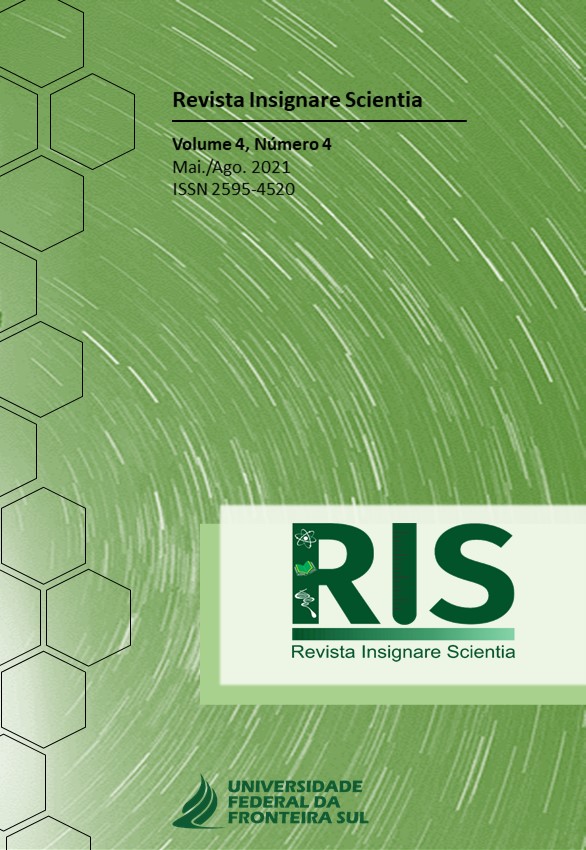
Insignare Scientia Journal
Vol. 4 No. 4 (2021)May/Aug. 2021
The Insignare Scientia Journal (RIS) is a collective action resulting from the work carried out at the Universidade Federal da Fronteira Sul (UFFS), Campus Cerro Largo - RS, in the area of Natural Sciences, linked to the Study and Research Group in Science and Mathematics Teaching (GEPECIEM) and the Postgraduate Program in Science Teaching (PPGEC).
In this fourth year of RIS edition, we have much to celebrate, as we are receiving many submissions in the continuous flow, as well as in special editions. In addition, we have the assignment of the DOI and indexing processes in different databases. These registrations provide dissemination in national and international directories, thus expanding the dissemination and visibility of articles published worldwide. Furthermore, we have a counter that was inserted on the magazine page and is already showing positive results! In this volume, we take the opportunity to publish 19 academic papers distributed across the different sections of RIS, including research results, experiences, and didactic propositions as a way to project a scenario of science education that can be critical, reconstructive, and transformative at the same time.
We take this opportunity to thank the reviewers who donate their time to build new learning, as well as the researchers who submitted papers, because ideas are the starting point for scientific development.
May we have a long life for RIS.
We wish everyone a good read!
Prof. Dr. Rosangela Inês Matos Uhmann - Editor of RIS
-
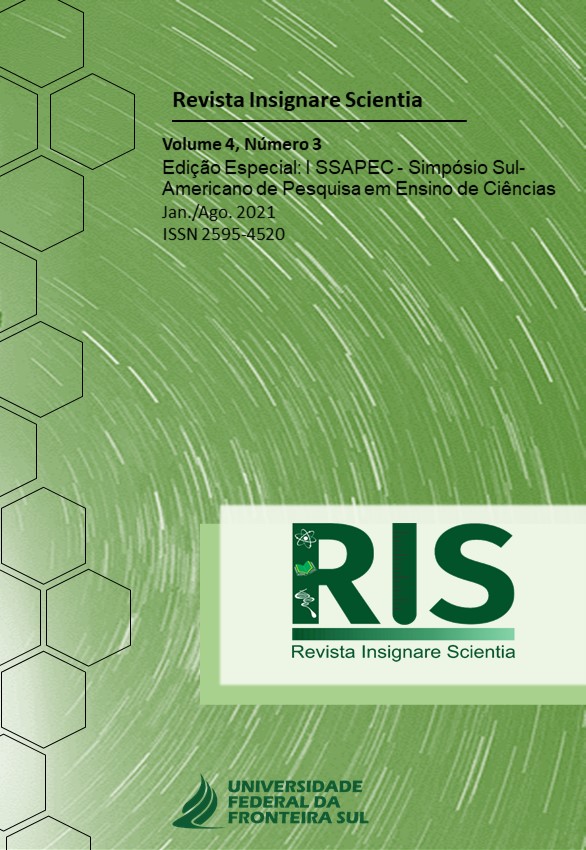
Special Edition: I SSAPEC - South American Symposium on Science Education Research
Vol. 4 No. 3 (2021)This special edition of RIS features articles resulting from research presented at the I South American Symposium on Science Education Research. These articles contemplate different research conducted in various South American institutions, problematizing different themes linked to the thematic axes that composed the event.
It consists of thirty-seven articles that consider the relationship of research in science education and related areas from different theoretical-methodological perspectives, levels, and teaching modalities, with research that traverses the processes of teaching and learning and conceptual meaning, as well as those that discuss the initial and continuing training of teachers, teaching knowledge, and professional development.
We thank the authors and researchers for providing us with this publication with such a wealth of reflections and references.
A good read!
-
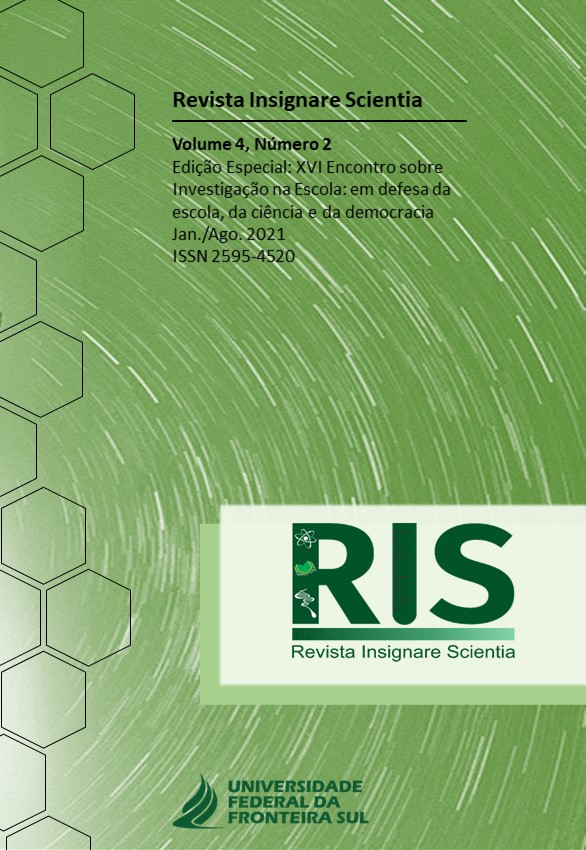
Special Edition: XVI Meeting on Research in School: in defense of school, science, and democracy
Vol. 4 No. 2 (2021)In the special edition: "XVI Meeting on Research in School: in defense of school, science, and democracy" feature experience reports that are the results of a research process in, for, and about practice. The reports consist of works that were socialized and discussed in the sharing of practices that is characteristic of the Meeting on Research in the School.
The themes point to real teaching contexts that, through the process of writing, socialization, and reflection, constitute themselves as experience. All this path taken by the investigation allows new perspectives and understandings about being and doing teaching.
Therefore, we invite everyone to read, as we believe that it enables, based on the reported experiences, the mirroring of practices and, with that, new teaching possibilities. We already thank and congratulate the teachers who have embarked on this movement of writing and research about their practice and, to the Meeting on Research in the School for the opportunity.
Prof. Dr. Judite Scherer Wenzel
Section Editor of RIS -
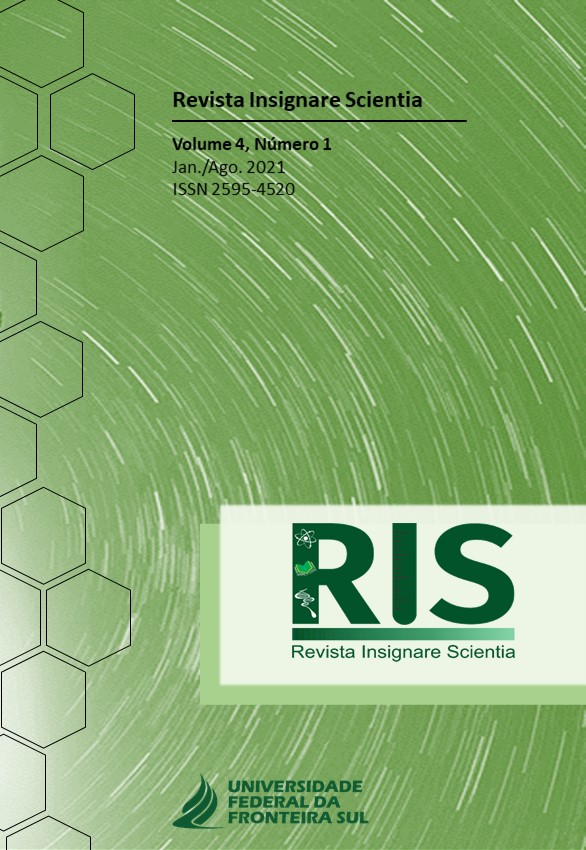
Insignare Scientia Journal
Vol. 4 No. 1 (2021)Jan./Apr. 2021
The Insignare Scientia Journal (RIS) is a collective action resulting from the work carried out at the Universidade Federal da Fronteira Sul (UFFS), Campus Cerro Largo - RS, in the area of Natural Sciences, linked to the Study and Research Group in Science and Mathematics Teaching (GEPECIEM) and the Postgraduate Program in Science Teaching (PPGEC).
As we begin our fourth year of publication, we have much to celebrate, as we are receiving many submissions in the continuous flow, as well as in special editions. In addition, we have the assignment of the DOI and indexing processes in different databases. These registrations provide dissemination in national and international directories, thus expanding the dissemination and visibility of articles published worldwide.
In this volume, we take the opportunity to publish 14 academic papers distributed across the different sections of RIS, including research results, experiences, and didactic propositions as a way to project a scenario of science education that can think, make itself, and be critical while at the same time reconstructive and transformative.
We take this opportunity to thank the reviewers who donate their time to build new learning, as well as the researchers who submitted papers, because ideas are the starting point for scientific development.
May we have a long life for RIS.
We wish everyone a good read!
Prof. Dr. Rosangela Inês Matos Uhmann - Editor of RIS
-
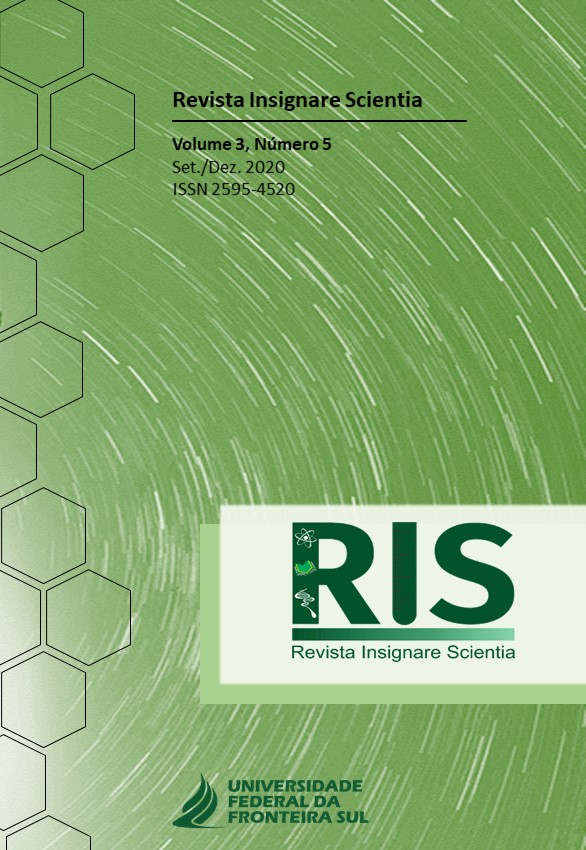
Insignare Scientia Journal
Vol. 3 No. 5 (2020)Sep./Dec. 2020
The Insignare Scientia Journal (RIS) is a collective action resulting from the work carried out at the Universidade Federal da Fronteira Sul - UFFS, Campus Cerro Largo - RS, in the area of Natural Sciences, linked to the Study and Research Group in Science and Mathematics Teaching - GEPECIEM and the Postgraduate Program in Science Teaching - PPGEC.
In our third year of publication, we have much to celebrate. There were so many submissions that we had to stop accepting them continuously to maintain the quality of the evaluation and editing processes of the volumes and keep the publication on schedule. However, we have already resumed the submission process and have not stopped publishing. Thus, we reached the end of 2020 with special volumes and Vol. 3 No. 5, which is the last of this year.
From the assignment of the DOI and indexing processes in different databases, the quality and dissemination of articles have gradually increased. These are the registrations, currently 13 indexers, that provide dissemination in national and international directories, thus expanding the dissemination and visibility of the articles published worldwide.
In this volume, we publish 32 academic papers distributed across the different sections of the RIS, including research results, experiences, didactic propositions, and thesis syntheses as a way to project a scenario of science education that can think, make itself, and be critical while at the same time reconstructive, dialogical, and transformative.
We take this opportunity to thank the reviewers who donate their time to build new learning experiences and the researchers who submitted their work this editorial year, as ideas are the starting point for scientific development.
I take this Editorial to say goodbye to the general edition of RIS, I now move to a more reserved position in this process which is that of Senior Editor, a group consultant who will facilitate qualification and consolidation processes of the journal through the search to compose special volumes, dissemination, and new indexations. At this moment, I need to thank our group and the Science Teaching area, researchers who spare no effort to edit this journal, and also thank the UFFS librarians who have been our support for this work.
Furthermore, I think I conclude by celebrating 3 years of work, news, and achievements. Publications, citations, and advances, but I mainly celebrate the good relationships and the expanded collective process. I also take this opportunity to officially introduce our new Editor-in-Chief: Prof. Dr. Rosangela Inês Matos Uhmann, who greatly honors us with this work, as well as the new editor of the Science Education Section who takes over: Prof. Dr. Eliane Gonçalves dos Santos, a toast to them.
May we have a long life for RIS.
We wish everyone good reading.
Prof. Dr. Roque Ismael da Costa Güllich - Editor of RIS
-
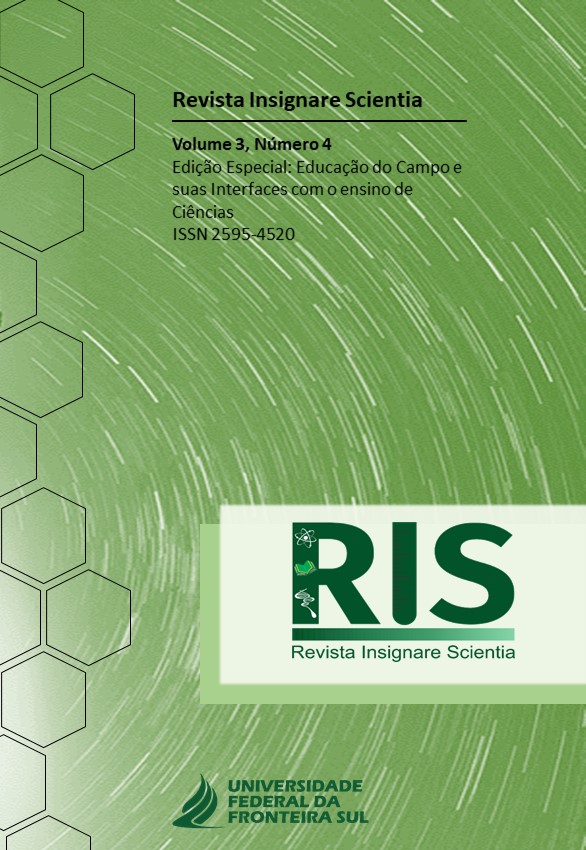
Special Edition: Dossier on Rural Education and its Interfaces with Science Education
Vol. 3 No. 4 (2020)This special edition of RIS presents the Dossier on Rural Education and its Interfaces with Science Education, which brings articles and experience reports that discuss/problematize issues of Science Education in Rural Education from different theoretical-methodological perspectives, representing the various possibilities of investigating pedagogical practice at different levels and modalities of education.
The Dossier is composed of twenty articles and eight experience reports that cover topics such as environmental education, supervised internship, and curriculum, among others, developed by researchers from different regions of Brazil, being evident in the reports and research the search for the approximation between the school and the experiential world of students in pedagogical practices, as well as the investigation of teaching and school practice, this search to achieve a true pedagogical praxis.
We thank the organizers of this Dossier for providing us with this publication with such a wealth of contexts and investigations.
A good read!
Prof. Dr. Rosemar Ayres dos Santos
Editor of RIS


